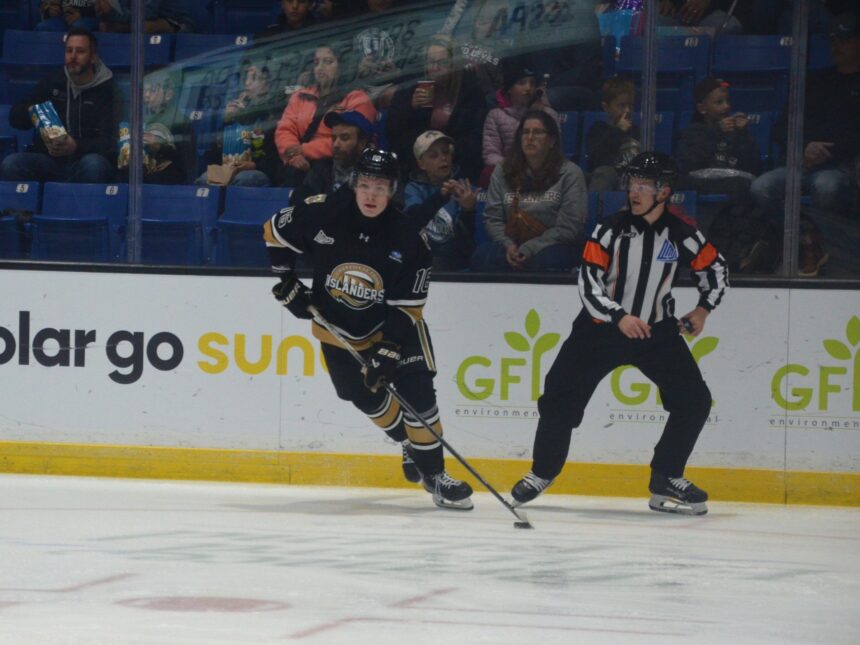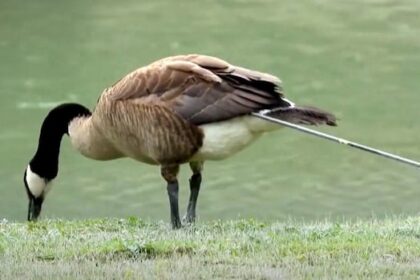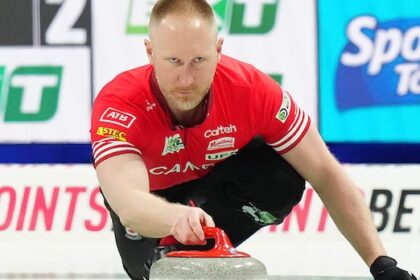Published Nov 13, 20256 minute readCharlottetown Islanders defenceman Nikita Voyaga, 16, carries the puck during a recent QMJHL game at Eastlink Centre in Charlottetown. Voyaga, from Moscow, is in his second season with the Islanders. Photo by Jason Simmonds /The GuardianArticle contentNikita Voyaga’s transition to the QMJHL was a lot different – and more challenging – than most rookies.THIS CONTENT IS RESERVED FOR SUBSCRIBERS ONLY.Subscribe now to access this story and more:Unlimited access to the website and appExclusive access to premium content, newsletters and podcastsFull access to the e-Edition app, an electronic replica of the print edition that you can share, download and comment onEnjoy insights and behind-the-scenes analysis from our award-winning journalistsSupport local journalists and the next generation of journalistsSUBSCRIBE TO UNLOCK MORE ARTICLES.Subscribe or sign in to your account to continue your reading experience.Unlimited access to the website and appExclusive access to premium content, newsletters and podcastsFull access to the e-Edition app, an electronic replica of the print edition that you can share, download and comment onEnjoy insights and behind-the-scenes analysis from our award-winning journalistsSupport local journalists and the next generation of journalistsRegister to unlock more articles.Create an account or sign in to continue your reading experience.Access additional stories every monthShare your thoughts and join the conversation in our commenting communityGet email updates from your favourite authorsSign In or Create an AccountorArticle contentNot only did Voyaga have to adapt to a new league, the second-year Charlottetown Islanders defenceman, from Moscow, also had to learn a new language and adjust to living in a new country.Article contentArticle content“It’s really challenging for these kids, in particular, a guy like Nikita,” said Islanders general manager and head coach Jim Hulton. “A lot of the Czech players and the Slovak players have a bit of a foundation of English, so they remind me more of the kids coming from Quebec where they pick up on the English a lot quicker.Article contentArticle content“But the Russian language is so completely polar opposite than ours, that the acclimation process is a lot longer. Fortunately, in Nikita’s case, he got paired with a great billet who’s helped him tremendously with the language barrier.Article content“But there’s so many different changes that they go through that the first year is almost a mulligan. I think you can see the difference in him. He’s a lot more comfortable in his surroundings here this year.”Article contentLanguage issueArticle contentVoyaga, who could not speak any English when he arrived in P.E.I. for the Islanders’ 2024 training camp, now has a good understanding of the language and life as a major-junior hockey player.Article content“It is awesome,” said Voyaga about playing for the Islanders. “It’s the best team I’ve played on in my life. It’s very good. I feel it is perfect here…Article content“I know everyone, like everyone and I have a lot of friends on the team. I have a good connection with the coaches, with friends, with my billet family. I feel very good here. I now say in interviews, ‘Charlottetown is my second home.’”Article contentArticle contentVoyaga said there are some differences and similarities between living in Russia and P.E.I.Article content“We have the same weather usually,” said Voyaga, who sat down with The Guardian for an interview at Eastlink Centre earlier this week. “It’s cold in Russia and it’s cold here. There is very good scenery, and the trees are beautiful.”Article contentVoyaga admitted he misses living in Russia, especially his family and girlfriend, but understands a move to North America was best for his hockey career.Article contentAsked what it’s like moving to a new country as a young hockey player, Voyaga answered it’s hard.Article content“When I came last year, for the first couple of months, I felt so bad,” said Voyaga, who added the Islanders’ coaching staff understood the language challenges and was patient.Article content“Sometimes coaches try to send me simple words and try to show me something,” said Voyaga. “Sometimes we can laugh about it because it is funny. The coaches understand I’m not perfect in English.”Article content Charlottetown Islanders defenceman Nikita Voyaga, 16, lines up for a faceoff during a QMJHL game at Eastlink Centre in Charlottetown recently. Photo by Jason Simmonds /The GuardianArticle contentRussian teammateArticle contentFortunately, for Voyaga, the Islanders had another Russian player – forward Egor Goriunov – with the team for the first half of the 2024-25 season.Article content“We have a very good connection,” said Voyaga, selected by the Islanders in the second round (70th overall), in the 2024 CHL Import Draft. “We were two Russians in a different country and now he’s like my best friend. He helped me so much.Article content“I would ask him everything, like, ‘Can coach tell me something,’ and ‘Igor, please translate for me.’Article content“This was hard, but the team, my billet family, my friends helped me. Now I feel so much better. When I went to Russia for the summer, I missed (P.E.I.) a little bit.”Article contentVoyaga recorded one goal and six points in 46 regular-season games with the Islanders as a rookie. So far this season, Voyaga has two assists in 20 regular-season games. But one of the most important statistics for defenceman is plus-minus. In that regard, Voyaga is maintaining consistency.Article contentArticle contentLast season, Voyaga was a plus-1 and he is plus-1 heading into the Islanders’ game against the Quebec Remparts at Eastlink Centre on Nov. 14 at 7 p.m.Article content“Everyone says I have improved my game,” said Voyaga. “I more understand Canadian hockey (now). It’s faster and it’s my second year in the league and I feel so much better on the ice. I can read the game and understand what’s going on now. I feel so confident.”Article contentPlaying potentialArticle contentHulton said the six-foot-three, 205-pound Voyaga has lots of upside and is living up to those expectations.Article content“We were all excited to kind of see the next step that he can take, and I think he’s done that,” said Hulton. “He used last years’ experience to create some more confidence for himself in the summer. He’s a rugged, hard-to-play against defenceman every team is looking for. He’s continuing to improve.”Article contentAn example of that is Voyaga’s selection for the inaugural QMJHL Prospects Game in Sherbrooke, Que., on Oct. 22.Article contentArticle content“I was so surprised they invited me,” said Voyaga. “It was really good.Article content“There was like six Russian guys, and we had a good connection. I was able to speak my home language a lot… It was a good experience.”Article contentArticle contentVoyaga is eligible for the 2026 NHL Entry Draft, but is not allowing that to be a distraction.Article content“I try not to think about it and just play my game,” said Voyaga. “I want to improve my hockey career, but I need to just play my game.Article content“I want to help my team win and I want us to win the Cup (Gilles-Courteau Trophy as QMJHL champions).”Article contentFan favouriteArticle contentVoyaga has endeared himself to P.E.I. fans with his willingness to play physical.Article content“I know what I can do good and what I can do for my team,” said Voyaga. “I like the physical game. The fans like it and everyone likes it.”Article contentHulton said Voyaga brings great energy to the rink every day. A big part of Voyaga’s growth and maturation is understanding the right time to go for those big hits.Article content“He loves to hit, which is something I think all hockey fans and coaches like,” said Hulton. “But it’s a matter of timing.Article content“This league is so fast and so skilled that if you jump at the wrong time, even though you might get the big hit, you’re going to give up a Grade A (scoring) opportunity. Your No. 1 job, as a defenceman, is just that – to defend. There’s a timing and it’s a fine line as a coach.Article contentArticle content“I believe it was (former Los Angeles Dodgers manager) Tommy Lasorda used to talk about coaching was like hanging onto a bird – if you’re too loose, it’s going to fly away. If you’re too tight, you’re going to crush it.Article content“It’s kind of the same thing with a kid like Nikita. You don’t want to take that aggression out of him, yet you also want to teach some timing sense about it.”Article contentDefence partnerArticle contentVoyaga has been paired with Emile-Alexandro Lemieux-Goupil for most of this season.Article content“We have a good connection,” said Voyaga. “I like playing with Goups.Article content“It’s both our draft year and we want to help each other and play good defence.”Article contentHulton said it’s not easy to play in the QMJHL as a young defenceman. Hulton added Voyaga and Lemieux-Goupil both experienced growing pains as rookies but they learned from different situations.Article content“There’s a calmness about their game now that we were hoping for,” said Hulton. “They are both rugged, physical guys, but they’re understanding when to go (up the ice), when to hit, how to hit, how to hold back, and situational play.Article contentArticle content“It’s all part of the process of learning how to be a good defenceman in this league.”Article contentArticle contentHockey Fights Cancer NightArticle contentThe Charlottetown Islanders host back-to-back QMJHL games at Eastlink Centre this weekend.Article contentThe Quebec Remparts provide the opposition on Nov. 14, and the Drummondville Voltigeurs visit P.E.I.’s capital city on Nov. 15. Both games start at 7 p.m.Article contentIt’s Hockey Fights Cancer Night on Nov. 14. Anyone who is currently battling cancer or has survived cancer can attend the game free of charge. The Islanders have announced Lauchlan (Lauchie) McCabe as this year’s Hockey Fights Cancer ambassador. A hockey goaltender, who hopes to return to the ice as soon as he can, McCabe was diagnosed with B-cell acute lymphoblastic leukemia in June.Article contentArticle contentEntering league play on Nov. 13, the Islanders sat alone in first-place overall in the 18-team QMJHL with a record of 12-5-1-3 (won-lost-overtime losses-shootout losses).Article contentThe Remparts are 8-9-1-0 while the Voltigeurs sit at 12-4-1-1.Article contentArticle contentJason Simmonds is the sports editor at The Guardian in Prince Edward Island. He can be reached at jsimmonds@postmedia.com and followed on X @JpsportsJason.Article content
From Russia to P.E.I., Voyaga settling in with Charlottetown Islanders










